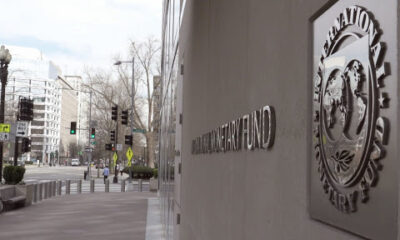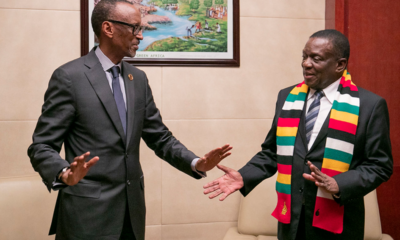
Opinion
Reflections on the GNU and the 2013 Constitution (Part 2)
Published
2 years agoon
By
NewsHawksBook Excerpt from: In Search of the Elusive Zimbabwean Dream, Volume III (Ideas & Solutions)
By Professor Arthur G.O. Mutambara
FROM the GNU, fast forward to the future.
Further proof and testimony of the reactionary nature of some of the provisions of our 2013 National Constitution, in particular Section 72, follow swiftly as Mnangagwa’s embattled Government on 29 July 2020 signs the Global Compensation Deed Agreement with the representatives of the former commercial farmers.
The objective of the despicable and sell-out arrangement is to compensate former White colonisers for the so-called “improvements” on the land.
Yet, the dispossessed victims of colonialism receive no compensation for their stolen labour, abused land (which was taken by force and used without their consent or benefit), land use opportunity cost, seized livestock, destruction of livelihoods and loss of lives.
The principled position is that there should be no compensation to the colonisers under any conditions or circumstances.
There should be neither compensation for the land nor for “improvements” on the land. Moreover, in the Mnangagwa compensation framework, the responsibility for restitution is placed on the entire citizenry.
Yet, the individuals who benefitted from seizing the farm assets and infrastructure are known.
These individuals make no specific contribution to the payment exercise.
Even the idea of global fundraising for the compensation does not cure the travesty.
The debt or donations will be accrued on behalf of every Zimbabwean taxpayer.
All this is executed in pursuit of immoral, ahistorical and unjust compensation.
Of course, the regime argues that the compensation deal “adheres to the Constitution of the Republic of Zimbabwe”.
On 3 August 2020, in response to blistering attacks and derisive condemnation by SA’s opposition party – The Economic Freedom Fighters (EFF), the Zimbabwe Embassy in SA decides to take action.
In a report titled “Zimbabwe Upholds Constitution by Signing Land Compensation Agreement”, covered by ZBC, Ambassador David Hamadziripi boldly asserts:
“For the record, the provisions of the Global Compensation Deed Agreement signed on 29 July 2020 between the Government of Zimbabwe and representatives of the former commercial farmers fully adhere to the Constitution of the Republic of Zimbabwe, in particular, Section 72, which deals with ‘Rights to Agricultural Land’.
That section stipulates in paragraph 3(a) that where agricultural land is compulsorily acquired for a public purpose, no compensation is payable in respect of its acquisition, except for improvements effected on it before its acquisition.
This is what the signed compensation agreement of 29 July 2020 provides for. The Government of Zimbabwe will compensate the former farmers for the improvements on the acquired land ONLY. No more. There is nothing treasonous in upholding one’s own national Constitution.”
The full provisions of Section 72(3) of the 2013 Constitution state as follows:
“Where agricultural land, or any right or interest in such land, is compulsorily acquired for a purpose referred to in Subsection (2)-
a) no compensation is payable in respect of its acquisition, except for improvements effected on it before its acquisition;
b) no person may apply to a court for the determination of any question relating to compensation, except for compensation for improvements effected on the land before its acquisition, and no court may entertain any such application; and
c) the acquisition may not be challenged on the ground that it was discriminatory in contravention of section 56.”
What a shame.
These unwise provisions we included in the 2013 National Constitution have created fertile ground for retrogressive anti-people shenanigans.
Indeed, we played hostage to fortune.
I intensely regret this.
What is worse, Zimbabwe’s inept, directionless and divided opposition groups are united in their treacherous silence on this diabolical and disgraceful deed between the miserably incompetent – and desperately seeking legitimacy and respite from Europe and the United States – Mnangagwa regime and the former White farmers.
As for the hypocritical, self-interest-focused, and kith-and-kin-politics-driven West – they are ecstatic.
Their cousins are sorted.
More importantly, a precedent has been set where the victim compensates the criminal.
This is good news for the former colonisers and slave owners across the world.
However, some of the unrepentant hardliner imperialists are not satisfied. They want more:
“There must be compensation for the land itself. In fact, the land reform programme must be reversed!”
Anyway, back to the compensation deed – the thought of challenging it in the Constitutional Court is moot.
Firstly, in the main, the arrangement is constitutional.
Secondly, even if you are going to argue for the beneficiaries of the seized “improvements” to pay the compensation, it is an unwinnable case.
Most of the judges are among such beneficiaries.
They cannot rule against themselves.
They are conflicted and soundly captured through the corruptly executed land reform program.
“Cry, the beloved country.”
Indeed, we join Alan Paton in profound exasperation.
As if paying compensation for the so-called improvements was not enough treachery, the Mnangagwa regime goes further and offers compensation for the land itself while providing for the return on to the land for some of the White former farmers.
The Herald newspaper of 1 September 2020, in an article titled “Government Moves to Maximise Agricultural Production”, reports the following remarks by Minister of Finance Mthuli Ncube:
“Farm owners who are indigenous Zimbabweans or citizens of countries which had ratified Bilateral Investment Protection and Promotion Agreements or Bilateral Investment Treaties with Zimbabwe at the time their land was compulsorily acquired for resettlement are entitled to compensation for both land and improvements, in terms of subsections (1) and (2) of Section 295 of the Constitution of Zimbabwe.
… Government has already provided that these former farm owners can apply in writing to the Minister of Lands, Agriculture, Water and Rural Resettlement for restoration of title to the piece of agricultural land that was compulsorily acquired from them for resettlement.”
It is unbelievable!
What a despicable betrayal.
Indeed, it is an outright negation of the land revolution.
Once again, the 2013 Constitution provides cover for these unprincipled shenanigans by a despotic regime desperate for accommodation with imperialism and Western capital.
Section 295, titled “Compensation for Acquisition of Previously-Acquired Agricultural Land”, states as follows:
1. Any indigenous Zimbabwean whose agricultural land was acquired by the State before the effective date is entitled to compensation from the State for the land and any improvements that were on the land when it was acquired.
2. Any person whose agricultural land was acquired by the State before the effective date and whose property rights at that time were guaranteed or protected by an agreement concluded by the Government of Zimbabwe with the Government of another country, is entitled to compensation from the State for the land and any improvements in accordance with that agreement.
3. Any person, other than a person referred to in Subsection (1) or (2), whose agricultural land was acquired by the State before the effective date is entitled to
compensation from the State only for improvements that were on the land when it was acquired.
4. Compensation payable under subsections (1), (2) and (3) must be assessed and paid in terms of an Act of Parliament.
Once again, our sell-out provisions in the 2013 Constitution have come to haunt us.
It is also prudent to note that only some of the requirements of the law are being adhered to.
As indicated above, Section 295(4) provides that any compensation “must be assessed and paid in terms of an Act of Parliament”.
This legal instrument has not been enacted, yet the compensation deed has been promulgated, and further decisions have been made on payments for the land itself and restoration of title.
The primary motivation for these rushed and treacherous moves on the land agenda is the palpable desperation of the despotic regime in Harare.
They are divided, insecure and edgy.
The objective is to use the unrefined and unsound pronouncements on land to seek accommodation with Western governments and obtain some reprieve from the isolation they are being subjected to because of gross human rights violations, widespread corruption and profound state-craft illiteracy.
Of course, the progressive people of Zimbabwe are livid about the duplicitous attack on the ethos of the land revolution.
Under a barrage of attacks from various quarters, including war veterans, Mnangagwa tries pacifying the incensed country by declaring that no taxpayers’ funds will be used to compensate White former commercial farmers for improvements made on farms.
“The money will be sourced externally,” the regime insists.
The Sunday Mail newspaper of 13 September 2020, through a piece titled “President clears air on land, SA envoys”, reports him as saying:
“We, however, have a few individuals who fail to understand or comprehend our Constitution, Section 295 of the Constitution.
… The position is that as Zimbabweans, we shall not pay compensation for land, and that remains … we are saying no taxpayer’s money will be used to pay that compensation. …
… We have set up a committee including White former farmers to go to Europe where they will raise the money to pay under the Agreement. Then we hear some individuals who are unable to comprehend just one provision saying: ‘We want to reverse the land reform programme’, NO!”
Poor Emmerson.
Well, well, well.
He has his knickers in a twist, and yes, ‘he doth protest too much!’
The same Sunday Mail article goes on to betray him and expose his pathetic dishonesty by stating that:
“A Joint Resources Mobilisation Committee to work with the Ministry of Finance and Economic Development was established to raise funds through long-term debt and other financial instruments with a tenure of up to 30 years.”
Surely, how can the taxpayers be responsible for paying back the “long-term debt and other financial instruments with a tenure of up to 30 years”?
This means the taxpayer’s money will be used to compensate the White farmers.
What a clumsy and unintelligent political gladiator!
In any case, it is part of a government’s mandate to raise resources internally and externally in pursuit of the interests of the citizens – the taxpayers.
Once you start raising resources externally for any purpose other than that, you are undermining the interests of the taxpayers.
There is no way out of the criminal and counter-revolutionary import of both the compensation deed and the decision to return land to Whites (restoration of title) while paying compensation for the land itself in some cases.
Of course, the fact that the 2013 Constitution has provided loopholes enabling this treachery is problematic.
The traditional critics of the 2013 Constitution are having a field day.
On 5 September 2020, in an article in the state newspaper – The Herald – titled “POLAD backs farmers’ compensation”, NCA President Lovemore Madhuku gleefully says:
“The Constitution provides for it [compensation], and if you have to blame anything, you have to blame the Constitution, and if you blame the Constitution, you have to blame the people of Zimbabwe for endorsing that Constitution.”
There we are.
I guess Bill Clinton’s chief strategist, James Carville, would say: “It is the 2013 Constitution, stupid!”
It is fair and just to ask:
“Why did we allow in the 2013 Constitution the various ill-conceived, reactionary and undemocratic provisions which have such a debilitating impact?
Why did we leave the imperial presidency largely untouched?
Did we not understand the implications of our egregious omissions and commissions?
Surely, we cannot get away with just expressing regret.
What went wrong?”
The answer is quite simple.
Among us was the misguided, unprincipled and opportunistic ambition to enjoy those same unbridled powers and undeserved privileges if one day the opposition forces were swept into office.
Of course, that naiveté and misplaced expectations preoccupied mainly our MDC-T party colleagues who felt that the presidency of Zimbabwe and the control of Parliament were within reach for them.
“When we take over as the MDC-T, we want to enjoy and utilise those excessive presidential powers. It will be our time to eat and misrule.”
Of course, it was an unforgivable miscalculation – a blunder of monumental proportion.
What a shame!
Unfortunately, this unstrategic predisposition on the part of the opposition is still with us in the year 2020.
As ZANU-PF assails the 2013 National Constitution in a bid to reinforce the imperial presidency through the Constitution of Zimbabwe Amendment (No. 2) Bill, there is muted, incoherent and non-committal push-back from the MDC Alliance – the main opposition in Zimbabwe.
“Well, we may snatch the country’s presidency and enjoy those imperial powers. Let ZANU-PF do the dirty work using their two-thirds constitutional majority. We have nothing to lose and everything to gain.”
That seems to be the uncouth and lame attitude of Zimbabwe’s main opposition.
Sad.
Through Sections 71 and 72, the 2013 National Constitution marks the historic compromise between the White Rhodesian commercial farmers, the Black nationalists in ZANU-PF and Western capital.
Ostensibly, the nationalists were never committed to social revolution but instead sought to be included in a deracialised national bourgeoisie working in concert with global imperialism.
As students at the University of Zimbabwe in the late 1980s – together with our colleagues in the labour movement – we knew this.
We clearly articulated our opposition to the post-colonial nationalist petit-bourgeois, moribund monopoly capitalism, and global imperialism.
However, in 2013, as we – former student and labour leaders – constitute and run the GNU with ZANU-PF, we have mellowed, to put it politely.
In fact, we have sold out the revolution!
In our two MDC parties, we have the strong influence of former Rhodesian farmers, White liberals, the comprador bourgeois, local business elites and global imperialism – through the explicit involvement of Western governments and, in particular, the United States and the United Kingdom.
Of course, these meddling interests would not allow us to challenge the adoption of Sections 71 and 72.
On some platforms, colleagues from the MDC parties championed the inclusion of these sections.
Even in August 2020, they fervently defend these provisions and the compensation deed of 29 July 2020.
Their deceitful and self-serving refrain is that:
“Yes, the compensation must be paid. However, it must be footed by the beneficiaries of the land reform programme.”
My MDC colleagues do not want to accept the broader and more fundamental absurdity of the enslaved person compensating the slave owner, the colonised paying restitution to the coloniser.
Of course, they must be cautious not to upset their White colleagues, global business backers and supporters in Western capitals.
It is called selling one’s soul to the devil.
It is both pathetic and tragic.
Ultimately, my robust critique, expressed several times during the constitution-making process, remains impenetrable and unassailable.
I argued that it is not enough to have a New Constitution – a beautifully written document.
It is just a piece of paper and will NOT suddenly solve our problems.
A good national constitution is a necessary but NOT sufficient condition for democracy, development and prosperity.
We need constitutionalism in addition to a people-driven governance charter.
As I have repeatedly argued ad nauseam:
Achieving constitutionalism – the behaviour, tradition, and culture of respecting the Constitution – is much harder than adopting a New National Constitution.
Constitutionalism cannot be legislated or declared into existence by acclamation.
It is about slowly and diligently developing a value system and mindset different from our country’s.
This will require civic education, social mobilisation and exemplary servant leadership.
Establishing a Zimbabwe Civic Education Commission would have helped in this endeavour.
What is in our hearts and minds is as important as what is in the 2013 National Constitution.
My disposition is in keeping with the wise words of US Judge Billings Learned Hand in the “Spirit of Liberty” speech, which he delivered in 1944 to celebrate “I am an American” Day.
Learned Hand was a US judge and judicial philosopher who served in the US Southern District of New York and later in the United States Court of Appeals for the Second Circuit.
He posits as follows:
“Liberty lies in the hearts of men and women; when it dies, there, no constitution, no law, no court can save it; no constitution, no law, no court can even do much to help it.
The spirit of liberty is the spirit which is not too sure that it is right; the spirit of liberty is the spirit which seeks to understand the minds of other men and women; the spirit of liberty is the spirit which weighs their interests alongside its own without bias.”
Our national constitutional journey must continue.
However, we should pay more attention to the fundamental need to change what is in the hearts and minds of Zimbabwean men and women.
That agenda is more critical than drafting a national constitution or creating rules and laws.
On 31 December 2019, the ZANU-PF government published the Constitution of Zimbabwe Amendment (No. 2) Bill, officially embarking on the process of amending our national charter.
Evidently, what is in the hearts and minds of the ZANU-PF leadership is not aligned with the letter and spirit of the country’s 2013 National Constitution.
This is an excerpt from the book: In Search of the Elusive Zimbabwean Dream, Volume III (Ideas & Solutions)
About the writer: Professor Arthur G.O. Mutambara is the director and full professor of the Institute for the Future of Knowledge (IFK) at the University of Johannesburg in South Africa.
You may like




















